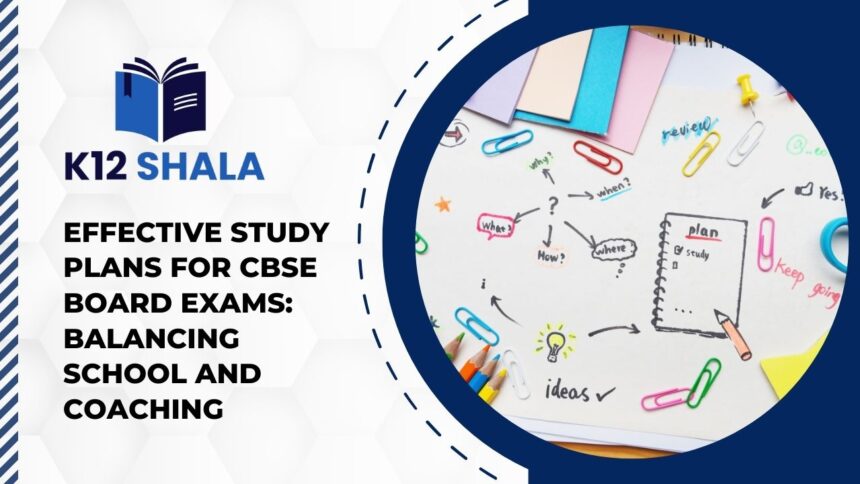Introduction to CBSE Board Exams
Are you gearing up for the CBSE Board Exams and feeling the pressure to excel? You’re not alone! As one of the most crucial milestones in a student’s academic journey, these exams require careful planning and dedicated study efforts. But fear not, as we’ve got your back with effective study plans that will help you strike a balance between school curriculum and coaching classes. Let’s dive into some practical tips to ace those exams with confidence!
The Importance of a Study Plan
Are you feeling overwhelmed by the upcoming CBSE Board exams? One of the most crucial aspects of exam preparation is having a well-thought-out study plan. A study plan acts as your roadmap, guiding you through the vast syllabus and helping you stay organized.
By creating a structured study plan, you can effectively manage your time and ensure that you cover all the necessary topics before the exams. This will not only boost your confidence but also reduce last-minute cramming and stress.
Having a study plan in place allows you to allocate specific time slots for each subject, making it easier to balance school lectures and coaching classes. It helps in prioritizing tasks based on their importance and urgency while ensuring that no topic is left untouched.
Furthermore, a study plan enables you to track your progress regularly, identify areas that need more focus, and make adjustments accordingly. It instills discipline and consistency in your study routine, leading to better retention of information over time.
In essence, a well-crafted study plan is an indispensable tool that paves the way for effective learning and academic success during the CBSE Board exams.
Balancing School and Coaching
Balancing school and coaching can be a challenging task for many students preparing for their CBSE board exams. The pressure to perform well in both academics and competitive exams can often feel overwhelming. However, with proper planning and time management, it is possible to strike a balance between the two.
One effective strategy is to prioritize tasks based on their deadlines and importance. Make a list of all your commitments – classes, assignments, tests, etc., and allocate time accordingly. This will help you stay organized and ensure that nothing slips through the cracks.
Another key aspect of balancing school and coaching is communication. Keep your teachers and coaches informed about your schedule so they can provide support when needed. Don’t hesitate to ask for help or clarification whenever you feel stuck or overwhelmed.
Remember, it’s essential to take breaks and rest adequately to avoid burnout. Find activities that help you relax and recharge so you can return to your study sessions with renewed focus.
By staying proactive, communicating effectively, and taking care of yourself, you can navigate the demands of both school and coaching successfully.
Creating a Realistic Study Schedule
Are you struggling to find the right balance between school and coaching for your CBSE board exams? Creating a realistic study schedule is key to managing your time effectively. Start by assessing how much time you have available each day for studying. Consider your school hours, coaching classes, and other commitments.
Divide your study sessions into smaller blocks of time to focus on different subjects or topics. This will help prevent burnout and keep you motivated throughout the day. Prioritize difficult subjects or those that require more practice.
Include short breaks in between study sessions to refresh your mind and avoid mental fatigue. Use this time to stretch, snack on brain-boosting foods, or take a quick walk outside.
Adjust your schedule as needed based on your progress and upcoming exams. Remember, flexibility is key when creating a realistic study plan that works for you.
Utilizing Breaks and Downtime Effectively
When preparing for CBSE board exams, utilizing breaks and downtime effectively is crucial to maintain focus and productivity. Instead of mindlessly scrolling through social media or binge-watching TV shows during your break time, consider incorporating activities that can help refresh your mind.
Taking short walks outside or practicing deep breathing exercises can help clear your mind and boost concentration levels when you return to studying. Engaging in a hobby or listening to music can also provide a mental break while keeping you relaxed and motivated.
It’s essential to strike a balance between study sessions and breaks to prevent burnout and maintain optimal cognitive function. By strategically planning your downtime, you can recharge both physically and mentally, ensuring that you make the most out of your study sessions without feeling overwhelmed.
Tips for Staying Motivated and Focused
So, you’ve got your study plan all set up, but how do you stay motivated and focused throughout the journey towards your CBSE board exams? Well, here are a few tips to help you keep those distractions at bay and maintain your drive to succeed.
Setting specific goals can really give you something concrete to work towards. Whether it’s completing a certain number of chapters by the end of the week or scoring a particular grade in a practice test, having clear objectives can keep you on track.
Another way to stay motivated is by mixing up your study routine. Don’t be afraid to try different methods like flashcards, group study sessions, or teaching the material to someone else. Variety can help prevent boredom and keep things interesting.
Additionally, staying organized is key. Keep your study space clutter-free and have all the necessary materials within reach. A tidy workspace can help clear your mind and improve focus.
And remember, it’s essential to take breaks when needed. Overworking yourself can lead to burnout – so schedule short breaks in between study sessions to recharge both physically and mentally.
By implementing these simple tips into your study routine, you’ll be better equipped to stay motivated and focused as you prepare for your upcoming CBSE board exams!
Incorporating Practice Tests and Mock Exams
Practice tests and mock exams are essential tools for preparing for CBSE board exams. They not only help you assess your understanding of the subjects but also familiarize you with the exam format and time constraints. Incorporating regular practice tests into your study plan can greatly enhance your confidence and readiness for the actual exams.
When incorporating practice tests, it’s important to simulate exam conditions as closely as possible. Find a quiet space, set a timer, and strictly adhere to the test rules. This will help you get accustomed to the pressure of timed exams and improve your time management skills.
Reviewing your performance after each practice test is crucial. Identify areas where you struggled or made mistakes, and focus on improving them in your subsequent study sessions. Use these mock exams as learning opportunities to pinpoint weaknesses and turn them into strengths before the actual board exams.
By integrating practice tests strategically into your study schedule, you can track your progress, identify areas for improvement, and build confidence in tackling challenging questions effectively during the CBSE board exams.
Preparing for Multiple Subjects
Preparing for multiple subjects can be overwhelming, but with the right approach, it’s definitely manageable. Start by creating a study plan that allocates specific time slots for each subject. This will help you stay organized and focused on covering all necessary topics.
Utilize different study techniques for each subject based on its requirements. For example, practice solving Math problems regularly while focusing on memorization techniques for subjects like History or Biology.
Consider grouping similar subjects together in your study schedule to make transitions smoother and more efficient. This way, you can maintain a flow of concentration without constantly switching gears.
Don’t forget to prioritize subjects based on their weightage in the exams and your personal proficiency levels. Give more attention to areas where you need improvement while maintaining a balance across all subjects.
Remember to take breaks between studying different subjects to avoid burnout and keep your mind fresh and alert throughout your preparation journey.
The Role of Healthy Habits in Studying
Maintaining healthy habits is crucial when it comes to studying effectively for CBSE board exams. Adequate sleep, regular exercise, and a balanced diet can significantly impact your focus and productivity.
Getting enough rest ensures that your brain functions optimally, allowing you to retain information better during study sessions. Exercise not only boosts energy levels but also improves concentration and memory retention.
Eating nutritious foods like fruits, vegetables, whole grains, and lean proteins provides the necessary fuel for your brain to function at its best. Hydration is key as well – staying hydrated helps with cognitive performance.
Incorporating short breaks for physical activity or relaxation throughout your study schedule can prevent burnout and enhance overall well-being. Remember, taking care of your body is just as important as feeding your mind with knowledge!
Final Thoughts and Recommendations
As you gear up for the upcoming CBSE Board exams, remember that creating an effective study plan is key to your success. By finding a balance between school and coaching commitments, setting realistic study schedules, utilizing breaks wisely, staying motivated, incorporating practice tests, preparing for multiple subjects, focusing on healthy habits, and seeking help when needed, you can maximize your studying efforts.
Remember that consistency is key in achieving your academic goals. Stay organized and dedicated throughout your preparation journey. With the right approach and mindset, you can tackle the CBSE Board exams with confidence.










